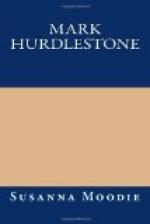Frightened at the daily alteration in her appearance, the Captain promised to grant her request. Her aunt gave a large party the night before they were to leave town; and Juliet, to please her kind relative, exerted herself to the utmost to appear in good spirits.
“There has been a shocking murder committed in your neighborhood, Miss Whitmore,” said the officer, with whom she had been dancing, as he led her to a seat. “Have you seen the papers?”
“No,” said Juliet, carelessly. “I seldom read these accounts. They are so shocking; and we read them too much as matters of mere amusement and idle curiosity, without reflecting sufficiently upon the awful guilt which they involve.”
“This is a very dreadful business indeed. I thought you might know something of the parties.”
“Not very likely. We lead such a secluded life at the Lodge, that we are strangers to most of the people in the neighborhood.”
“You have heard of the eccentric miser, Mark Hurdlestone?”
“Who has not?” and Juliet started, and turned pale. “Surely he has not been murdered?”
“Yes; and by his own son.”
“His son? Oh, not by his son! His nephew, you mean?”
“His son. Anthony Hurdlestone. The heir of his immense wealth.”
He spoke to a cold ear. Juliet had fainted.
How did that dreadful night pass over the hapless maiden? It did pass, however, and on the morrow she was far on her journey home.
“I never thought he could be guilty of a crime like this,” said the Captain to his sister as she sat opposite to him in his travelling carriage. His arm encircled the slender waist of his daughter, and her pale cheek rested on his shoulder. But no tear hung in the long, dark, drooping eyelashes of his child. Juliet was stunned; but she had not wept.
“He is not guilty,” she cried, in a passionate voice. “I know and feel that he is not guilty. Remember Mary Mathews—how strong the circumstantial evidence against him in that case. Yet he was innocent—innocent, poor Anthony!”
The Captain, who felt the most tender sympathy for the state of mind into which this afflicting news had thrown his child, was willing to soothe, if possible, her grief.
“If he is innocent it will be proved on the trial, Julee darling. We will hope for the best.”
“It will be proved,” said Juliet, sitting upright, and looking her father earnestly, if not sternly in the face. “I am so confident of his innocence that, on that score, I have not shed a single tear. Ah! we are drawing near home,” she continued with a sigh. “Dear home! why did I leave it? There is something pure and holy in the very air of home. See, papa! there is the church spire rising above the trees. The dear old elm trees! We shall have time to think here, to hope, to pray; but who is that woman lying along the bank. She is ill, or dead.”
“Perhaps she is intoxicated,” said Miss Dorothy.




